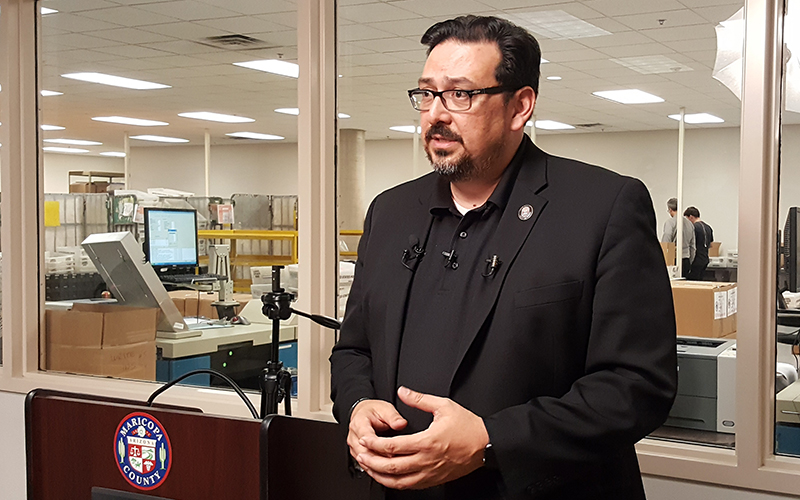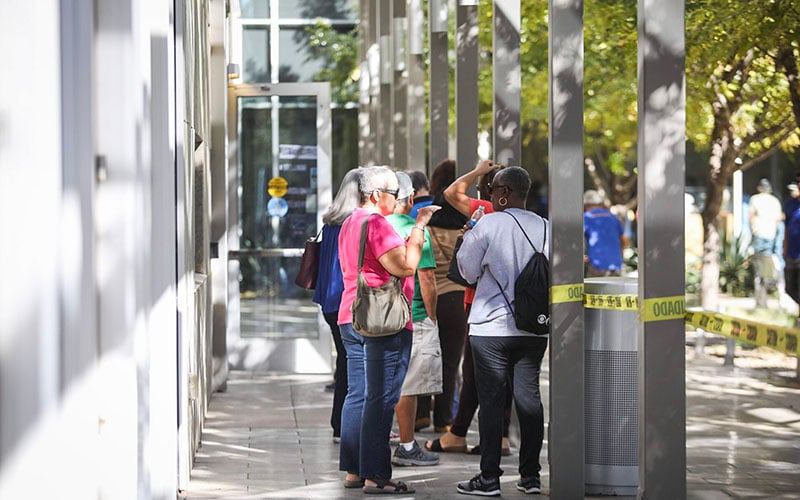PHOENIX — Maricopa County Recorder Adrian Fontes said the election system faced some hiccups during voting Tuesday, and some voters had to deal with long waits, technical snafus and closed polling locations.
“We will very likely get past a quarter of a million Maricopa County voters voting in person in this midterm,” Fontes said at a news conference Tuesday evening. “That is a record breaker, and we are very excited to be a part of getting that many folks out and making sure that they are able to vote.”
The line at the polling location at Arizona State University’s Tempe campus wrapped around the building just hours before the polls closed at 7 p.m. Tuesday.
First-time voter Hannah Peterson, 19, said she waited for an hour Tuesday morning but had to leave for class. When she came back in the afternoon, the line was “10 times longer.”
About 30 minutes before polls closed, about 300 people were still in line as others packed into the polling facility, poll observer Mark Robert Gordon said. He said wait times reached 2 1/2 hours, with election officials installing more equipment and voting booths.
Voters were in good spirits, with people delivering pizzas and water as music blared in the darkness.
“Younger voters are really enthused right now,” Fontes said. “They’re really getting out to vote this year, and that’s really exciting for us.”
He characterized the problems as minor.
“Today was not without hiccups,” he said. “That is what happens every time and every jurisdiction in the United States, you’ll see it, and you’ll hear about it.”
A Maricopa County Superior Court judge on Tuesday evening denied a request for a temporary restraining order to extend Maricopa County polling place hours, according to Eric Spencer, the state election director.
‘This is madness’
One voter said her polling place in Mesa came to a standstill after the computers stopped working. “This is voter suppression. … This is madness,” she wrote on Twitter.
It was a busy day throughout Arizona.
As of 3:30 p.m., the Secretary of State’s Office had fielded 1,007 election calls, according to a tweet from Spencer.
Spokesman Matt Roberts said Tuesday afternoon that state officials had not heard of any voting problems outside Maricopa County: “We haven’t heard anything out of the ordinary from the other 14 counties. It’s pretty normal for an off-year election.”
Earlier in the morning, Maricopa County’s Fontes said they had a “couple of bumps in the road,” as technical issues and locked doors caused problems at five of the county’s more than 500 polling places Tuesday.
Fontes said shortly after polls opened at 6 a.m. that poll workers could not get access to St. Nikolas Serbian Church in north Phoenix, and voters were redirected to Burton Barr Central Library and the recorder’s office downtown. He also urged voters in the San Michelle precinct in Mesa to go to the East Valley Institute of Technology or the recorder’s Mesa office to cast their ballots because of technology issues at the original precinct.
“We’re up and running. … We’ve got almost 500 locations that are completely open and, of course, like every Election Day, it’s par for the course, we’ve got a couple of bumps in the road,” Fontes said in a Facebook post. “But we’re going to make it through and, again, we’re resolving these issues as quickly as we can.”

Maricopa County Recorder Adrian Fontes was upbeat despite some issues early Tuesday, including a computer glitch that slowed voting for five minutes. (Photo by Jimmie Jackson/Cronkite News)
Foreclosure surprise
Those “bumps” included poll workers who showed up at the Chandler Golf Academy to find it locked because it had been foreclosed on overnight. After first promising to get that location open, Fontes said by mid-morning that his office had closed that site and was directing voters to a different suite at the same address just around the corner.
Ian Chrissinger waited in line for an hour to vote at the Chandler Golf Academy before leaving to vote at Chandler City Hall. He said he found it suspicious that a building with polling materials inside would be foreclosed on the night before the election.
“It kind of feels like I’m just being blocked from my ability to vote,” Chrissinger said.
At the Tempe History Museum, several voters said they were turned away because ballots could not be printed.
“On the voter card if it says a certain precinct you have to go there whether they’re allowing you to vote or not,” said Cyndi Curiel, a Tempe resident. “So, we waited in line since 6 a.m. just to get turned away.”
Theresa Borges said she and her husband tried to cast a ballot at the 32nd Street and Union Hills Drive location, but also got turned away. She said she doesn’t know where else to go to vote.
Arizona voters had already cast more ballots before polls opened Tuesday than they had in all of 2014’s midterms, and they headed to the polls today to finish an unusually high-profile midterm election year.
Fontes said election workers were checking in voters at “record rates,” but some locations did not have enough voting booths to quickly move people through the line.
“This isn’t a short ballot,” Fontes said. “People are being careful about filling out these ballots.”
Fontes said about 691,000 early ballots have gone through the county’s central count. By 11:50 a.m., Maricopa County had about 127,000 people get ballots and cast them in-person, Fontes said. In the 2016 election, the county had about 350,000 in-person voters over the course of the whole day.
A crucial election
Voters will decide whether to return Gov. Doug Ducey to office and which of two candidates will become the first woman from Arizona to serve in the U.S. Senate. They will also be electing the next Legislature, all nine of the state’s U.S. House members, statewide officers and settling a number of headline-grabbing ballot questions.
The secretary of state’s office reported Monday that nearly 1.59 million early ballots had been received, compared with 1.54 million for all of 2014.
Despite the focus on state races, however, this election is also being seen as a referendum on the first two years of President Donald Trump’s administration, with early polls indicating that Democrats could wrest back control of the House from Republicans for the first time since 2010.
A Democratic takeover of the Senate is considered less likely, but Arizona has one of the tightest and one of the more closely watched Senate races in the country.
That race pits Rep. Martha McSally, R-Tucson, against Rep. Kyrsten Sinema, D-Phoenix, in a contest to replace the seat vacated by Republican Sen. Jeff Flake, who is stepping down after one term.
A RealClear Politics analysis of six polls showed Sinema leading in two, McSally leading in three and the two tied in the sixth, with the leader in all the polls falling within the margin of error. As of Monday, McSally was holding a razor-thin lead of 0.2 percentage points over Sinema, according to RealClear Politics.
Sinema got a potential boost Thursday when Green Party candidate Angela Green, who was polling as high as 6 percent, dropped out of the race and endorsed the Democrat. Most political analysts said that was good news for Sinema, but some noted that it came after many registered Greens had already cast early ballots.
Arizona’s first woman in the Senate
Regardless of who wins, Arizona will elect its first female senator. And the Senate race will also shuffle the state’s House delegation, as new members will be elected to fill the seats vacated by McSally and Sinema.
Democrats are hoping to pick up the 2nd District that has been held by McSally, according to the Associated Press, with two-time House member Ann Kirkpatrick, a Democrat, squaring off against Republican Lea Marquez Peterson. Democrats are expected to hold on to Sinema’s 9th District seat in Phoenix.
The state already got one new House member this year, when Rep. Debbie Lesko, R-Peoria, won a special election to replace Trent Franks, a longtime Republican who resigned abruptly in the middle of an ethics investigation. Now, Lesko is defending the 8th District seat in a rematch of the April special election against Democrat Hiral Tipirneni. One recent poll showed Lesko leading Tipirneni by 4 percentage points, a number that’s within the margin of error.
On the state level, Ducey, a Republican, is up for re-election against Democrat David Garcia. Polls show Ducey with a clear lead.
Ducey has focused on border security and the state’s growing economy during the campaign while Garcia, an associate professor with the Mary Lou Fulton Teachers College at Arizona State University, has primarily focused on education policy and called for more education funding.
Ducey has pushed his work to raise teacher salaries after thousands of teachers and students hit the streets in the #RedForEd rallies this spring.
Five other statewide offices on the ballot include three – secretary of state, treasurer and superintendent of public instruction – where the incumbents are being replaced. The other two statewide offices, for attorney general and state mine inspector, feature incumbents defending their seats. There are also two seats open on the Corporation Commission.
4 propositions on the ballot
Four propositions are on the ballot, including Prop 305, which would greatly expand the state’s school voucher system, and Prop 127, which will determine the future energy makeup in the state.
In August’s primary election, computer glitches at 62 polls in Maricopa County caused voters to be relocated, wait in long lines and worry their votes might not be counted.
Fontes blamed third-party contractors for the problems in August and said Maricopa County Elections Department employees will handle operations for the general election.
Polls will remain open Tuesday until 7 p.m. Voters must bring identification, such as driver’s license or government issued ID card, with them to the polls.
Cronkite News reporters Chris McCrory and Ali Phillips contributed to this article.
Follow us on Twitter.


